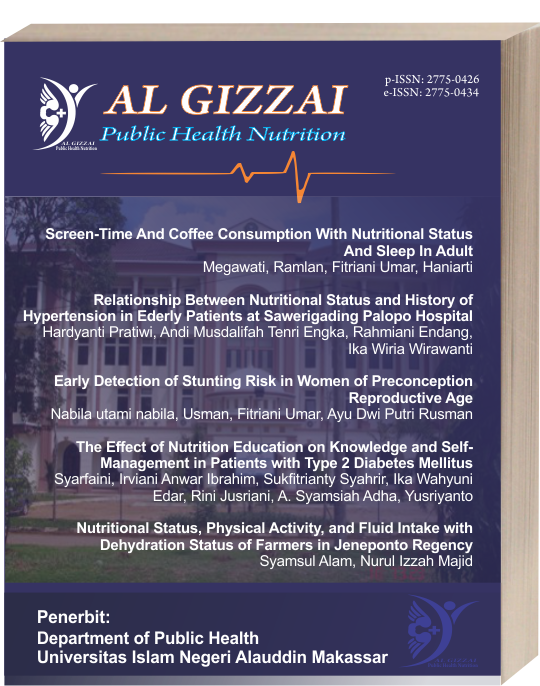The Effect of Nutrition Education on Knowledge and Self Management in Patients with Type 2 Diabetes Mellitus
Abstract
According to the International Diabetes Federation (IDF) in 2019 there were 463 million people suffering from diabetes. The purpose of this study was to determine the effect of nutrition education on the level of knowledge and self management in patients with type 2 diabetes mellitus at the Somba Opu Health Center in 2020. The type of research used is quantitative with pre post one group design research, and a quasy experiment approach. Accidental sampling technique with a total sample of 45 people with type 2 diabetes mellitus. Data collection used questionnaires, video media and leaflets. Data analysis used consists of 2 stages, namely univariate and bivariate (Anova test and Friedman test). The results of this study indicate that there is no effect of nutrition education on the level of pre-test knowledge in each intervention group, namely the p value ꞊ 0.155 patients with type 2 diabetes mellitus. There is an effect of nutrition education on the level of knowledge post test p value = 0.001, the level of self management pre test p value = 0.001 and the level of self management post test p value = 0.000 in each intervention group in patients with type 2 diabetes mellitus. With the incidence of diabetes mellitus, it is hoped that health workers will further improve the program in the field of counseling and provide education related to dietary therapy for food selection
References
Afriyani, A., Suriadi, S., & Righo, A. (2020). Media edukasi yang tepat pada pasien diabetes melitus tipe 2 terhadap kepatuhan diet: literature review. ProNers, 5(2). http://dx.doi.org/10.26418/jpn.v5i2.46167
De Lusignan, S., Liyanage, H., McGagh, D., Jani, B. D., Bauwens, J., Byford, R., Evans, D., Fahey, T., Greenhalgh, T.,Jones, N., Mair, F. S., Okusi, C., Parimalanathan, V., Pell, J. P., Sherlock, J., Tamburis, O., Tripathy, M., Ferreira, F., Williams, J., & Hobbs, F. D. R. (2020). COVID-19 Surveillance in a Primary Care Sentinel Network: In-Pandemic Development of an Application Ontology. JMIR Public Health and Surveillance, 6(4), e21434. https://doi.org/10.2196/21434
Dinkes Gowa. (2020). Profil Kesehatan Kabupaten Gowa. Dinas Keshatan Kabupaten Gowa.
Ernawati, S. . (2010). Faktor-Faktor Yang Berhubungan Dengan Terkendalinya Kadar Gula Darah Pada Pasien Diabetes Melitus di RSUP Fatmawati Jakarta Tahun 2009. https://repo-mhs.ulm.ac.id//handle/123456789/11260
Gunarm, D. S. (2008). Dasar dan Teori Perkembangan Anak. Jakarta: PT BPK Gunung Mulia.
Istianah, I., Septiani, S., & Dewi, G. K. (2020). Mengidentifikasi Faktor Gizi Pada Pasien Diabetes Mellitus Tipe 2 Di Kota Depok Tahun 2019. Jurnal Kesehatan Indonesia, 10(2), 72-78. http://www.journal.stikeshb.ac.id/index.php/jurkessia/article/view/255
Irma, R., Wahyuningsih, S., & Sake,R. (2017). Pengaruh Penyuluhan Gizi Terhadap Pengetahuan, Sikap Penyandang Diabetes Mellitus di Poliklinik Interna RSU Bahteramas Sulawesi Tenggara. Ilmu Gizi Indonesia, 1(1), 40–48. https://doi.org/10.35842/ilgi.v1i1.12
Kahn, S. E., Cooper, M. E., & Del Prato, S. (2015). Pathophysiology And Treatment Of Type 2 Diabetes: Perspectives On The Past, Present, And Future. The Lancet, 383(9922), 1068–1083. https://doi.org/10.1016/S0140-6736(13)62154-6
Krist, A. H., Devoe, J. E., Cheng, A., Ehrlich, T., & Jones, S. M. (2020). Redesigning Primary Care To Address The COVID1-9 Pandemic In The Midst Of The Pandemic. Annals Of Family Medicine, 18(4), 349–354. https://doi.org/10.1370/afm.2557
Kusnanto, K., Sundari, P. M., Asmoro, C. P., & Arifin, H. (2019). Hubungan tingkat pengetahuan dan diabetes self- management dengan tingkat stres pasien diabetes melitus yang menjalani diet. Jurnal Keperawatan Indonesia, 22(1). 31–42.
Mulyati, L., & Trimarliana, M. (2017). Model Pendidikan Interprofesional Dalam Upaya Peningkatan Kemampuan Kolaboratif Mahasiswa Kesehatan. Jurnal Ilmu Kesehatan Bhakti Husada: Health Sciences Journal, 6(2), 17–26. https://ejournal.stikku.ac.id/index.php/stikku/article/view/47
Nazriati, E., Pratiwi, D., & Restuastuti, T. (2018). Pengetahuan pasien diabetes melitus tipe 2 dan hubungannya dengan kepatuhan minum obat di Puskesmas Mandau Kabupaten Bengkalis. Majalah Kedokteran Andalas, 41(2), 59-68. https://doi.org/10.25077/mka.v41.i2.p59-68.2018
Nurhayati, E. (2018). Psikologi pendidikan inovatif (Vol. 2). Pustaka Pelajar.
Partika, R., Angraini, D. I., & Fakhruddin, H. (2018). Pengaruh Konseling Gizi Dokter terhadap Peningkatan Kepatuhan Diet Pasien Diabetes Melitus Tipe 2. Jurnal Majority, 7(3), 276-283. https://juke.kedokteran.unila.ac.id/index.php/majority/article/view/2091
Putri, N. A., & Pritasari, P. (2017). Effect Of Nutrition Education On Knowledge, Attitude, And Food Pattern Of Type 2 Diabetes Patients At Puskesmas Kecamatan Ciracas. ARGIPA (Arsip Gizi Dan Pangan), 2(2), 54– 64.
Putra, I. W. A. & Berawi, K. N. (2015). Empat Pilar Penatalaksanaan Pasien Diabetes Mellitus Tipe 2. Four Pillars Of Management Of Type 2 Diabetes Mellitus Patients. Majority4, 8–12.
Reeves, S., Lewin, S., Espin, S., & Zwarenstein, M. (2011). Interprofessional Teamwork For Health And Social Care (Vol. 8). John Wiley & Sons.
Sonyo, S. H., Hidayati, T., & Sari, N. K. (2016). Gambaran Pengetahuan Dan Sikap Pengaturan Makan Penderita DM Tipe 2 Di Wilayah Kerja Puskesmas Kendal 02. Care: Jurnal Ilmiah Ilmu Kesehatan, 4(3), 37–49. https://doi.org/10.33366/jc.v4i3.433
Yunitasari, T., Yuniarti, Y., & Mintarsih, S. N. (2019). Efektivitas Edukasi Empat Pilar Penatalaksanaan Diabetes Melitus Terhadap Pengetahuan, Sikap, Dan Perilaku Pasien Prolanis. Jurnal Riset Gizi, 7(2), 131-134. https://doi.org/10.31983/jrg.v7i2.5108
Widiasari, K. R., Wijaya, I. M. K., & Suputra, P. A. (2021). Diabetes Melitus Tipe 2: Faktor Risiko, Diagnosis, Dan Tatalaksana. Ganesha Medicine, 1(2), 114-120. https://doi.org/10.23887/gm.v1i2.40006
World Health Organization. (2020). Novel Coronavirus ( 2019- nCoV): situation report, 3. https://apps.who.int/iris/bitstream/handle/10665/330776/nCoVsitrep31Jan2020-eng.pdf
Copyright (c) 2023 Rini Rini

This work is licensed under a Creative Commons Attribution-NonCommercial-ShareAlike 4.0 International License.
Authors retain copyright and grant the journal right of first publication with the work simultaneously licensed under a Creative Commons Attribution-NonCommercial-ShareAlike 4.0 International License that allows others to share the work with an acknowledgment of the work's authorship and initial publication in this journal.
Authors are able to enter into separate, additional contractual arrangements for the non-exclusive distribution of the journal's published version of the work (e.g., post it to an institutional repository or publish it in a book), with an acknowledgement of its initial publication in this journal.
Authors are permitted to publish their work online in third parties as it can lead to wider dissemination of the work.










